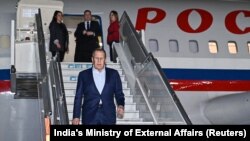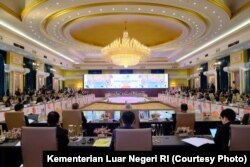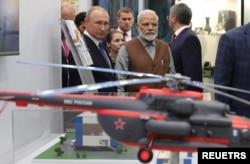On March 2, foreign ministers from the Group of 20 leading economies met in New Delhi as part of India’s preparations to host the eighteenth G20 meeting, set for September.
Tensions over Russia’s invasion of Ukraine overshadowed the meeting, with India issuing a statement noting that “most members strongly condemned the war in Ukraine and stressed it is causing immense human suffering and exacerbating existing fragilities in the global economy.”
India has declared neutrality in the conflict.
Russian state-affiliated accounts on Twitter boosted a video contrasting the arrival of German Foreign Minister Annalena Baerbock with that of Russian Foreign Minister Sergey Lavrov.
The clip was edited to show a receiving line of officials already in place to meet Lavrov at the bottom of the boarding stairs by his plane. Baerbock can be seen walking down the stairs and across the tarmac, where she is later greeted by officials.
Russia’s Embassy in Kenya retweeted the video with this commentary:
“Differences in how Russian and German Foreign Ministers Sergey Lavrov and Annalena Baerbock were met in India. India currently is the world’s most populous country.”
Other commentators more explicitly claimed the video shows India is signaling its support for Russia.
The clip is misleading, implying that differences in the way the two diplomats were greeted reveals India’s position on Russia and its invasion of Ukraine.
But there are no tea leaves to read. The German foreign minister simply got off her plane earlier than expected, while the Russian arrived late.
In the video showing Baerbock arriving in New Delhi, Germany’s Ambassador to India, Philipp Ackermann, can be seen running up to meet Baerbock after she has already shaken hands with other officials.
Ackermann told Indian media there was no diplomatic receiving line at the bottom of Baerbock’s plane simply because she arrived early:
“[Baerbock] was one of the first ministers to arrive on Thursday and we had to transfer her to the conference center. We said: ‘You know, this is a little early. Why don’t you stay in the plane for a while?’ And she said, ‘ja, ja, let’s stay in the plane,’ and she had some breakfast. And then, spontaneously, she decided to leave the plane without the receiving line being formed, but that was an entire German problem. It has nothing to do with Indian protocol.”
It also appears that more members of Russia’s diplomatic corps in India showed up to meet Lavrov upon his arrival in New Delhi. That, of course, has nothing to do with India.
While in New Delhi, Lavrov was jeered while speaking at the Raisina Dialogue, a multilateral conference on geopolitics and geoeconomics.
Lavrov told the conference that Moscow is “trying to stop” the war in Ukraine, “which was launched against us using Ukrainian people,” eliciting laughter and groans from the audience.
India has been called out for failing to criticize Russia’s invasion of Ukraine. It has also ramped up purchases of Russian oil since the war’s start, which New Delhi argues is in its own self-interest.
The United States has signaled it is “comfortable” with India’s decision to buy Russian oil and will not impose sanctions on New Delhi over it.
Russia is also India’s largest supplier of military hardware.
Analysts note that India’s ties with Russia date back to Soviet times, arguing that New Delhi has an interest in maintaining those ties, in part, to keep Russia from completely falling into “China’s fold.”
But ties between Germany and India are also strong, with the latter calling Germany one of its “most important partners both bilaterally and in the global context.”
Germany is India’s most important trading partner in the European Union. Last year, the two countries revived efforts at sealing a tree trade deal.
Germany also reportedly wants to build six conventional submarines for India. Reuters called that proposed $5.2 billion deal “the latest attempt by a Western military manufacturing power to wean New Delhi away from its dependence on Russia for military hardware.”







